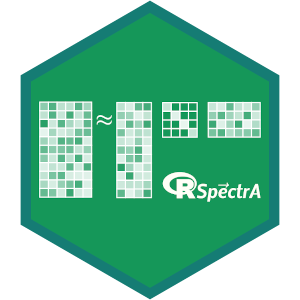Ecosyste.ms: Awesome
An open API service indexing awesome lists of open source software.
https://github.com/yixuan/RSpectra
R Interface to the Spectra Library for Large Scale Eigenvalue and SVD Problems
https://github.com/yixuan/RSpectra
eigenvalues spectra svd
Last synced: 3 months ago
JSON representation
R Interface to the Spectra Library for Large Scale Eigenvalue and SVD Problems
- Host: GitHub
- URL: https://github.com/yixuan/RSpectra
- Owner: yixuan
- Created: 2016-02-28T21:14:11.000Z (almost 9 years ago)
- Default Branch: master
- Last Pushed: 2024-07-21T04:34:27.000Z (7 months ago)
- Last Synced: 2024-10-28T17:24:55.009Z (4 months ago)
- Topics: eigenvalues, spectra, svd
- Language: C++
- Homepage: http://cran.r-project.org/package=RSpectra
- Size: 354 KB
- Stars: 80
- Watchers: 9
- Forks: 12
- Open Issues: 7
-
Metadata Files:
- Readme: README.md
Awesome Lists containing this project
README
## Solvers for Large Scale Eigenvalue and SVD Problems 
### Introduction
**RSpectra** is an R interface to the
[Spectra library](https://spectralib.org/).
It is typically used to compute a few eigenvalues/vectors of an `n` by `n`
matrix, e.g., the `k` largest eigen values, which
is usually more efficient than `eigen()` if `k << n`.
Currently this package provides the function `eigs()` for eigenvalue/eigenvector
problems, and `svds()` for truncated SVD. Different matrix types in R,
including sparse matrices, are supported. Below is a list of implemented ones:
- `matrix` (defined in base R)
- `dgeMatrix` (defined in **Matrix** package, for general matrices)
- `dgCMatrix` (defined in **Matrix** package, for column oriented sparse matrices)
- `dgRMatrix` (defined in **Matrix** package, for row oriented sparse matrices)
- `dsyMatrix` (defined in **Matrix** package, for symmetric matrices)
- `dsCMatrix` (defined in **Matrix** package, for symmetric column oriented sparse matrices)
- `dsRMatrix` (defined in **Matrix** package, for symmetric row oriented sparse matrices)
- `function` (implicitly specify the matrix by providing a function that calculates matrix product `A %*% x`)
### Examples
We first generate some matrices:
```r
library(Matrix)
n = 20
k = 5
set.seed(111)
A1 = matrix(rnorm(n^2), n) ## class "matrix"
A2 = Matrix(A1) ## class "dgeMatrix"
```
General matrices have complex eigenvalues:
```r
eigs(A1, k)
eigs(A2, k, opts = list(retvec = FALSE)) ## eigenvalues only
```
**RSpectra** also works on sparse matrices:
```r
A1[sample(n^2, n^2 / 2)] = 0
A3 = as(A1, "dgCMatrix")
A4 = as(A1, "dgRMatrix")
eigs(A3, k)
eigs(A4, k)
```
Function interface is also supported:
```r
f = function(x, args)
{
as.numeric(args %*% x)
}
eigs(f, k, n = n, args = A3)
```
Symmetric matrices have real eigenvalues.
```r
A5 = crossprod(A1)
eigs_sym(A5, k)
```
To find the smallest (in absolute value) `k` eigenvalues of `A5`,
we have two approaches:
```r
eigs_sym(A5, k, which = "SM")
eigs_sym(A5, k, sigma = 0)
```
The results should be the same, but the latter method is far more
stable on large matrices.
For SVD problems, you can specify the number of singular values
(`k`), number of left singular vectors (`nu`) and number of right
singular vectors(`nv`).
```r
m = 100
n = 20
k = 5
set.seed(111)
A = matrix(rnorm(m * n), m)
svds(A, k)
svds(t(A), k, nu = 0, nv = 3)
```
Similar to `eigs()`, `svds()` supports sparse matrices:
```r
A[sample(m * n, m * n / 2)] = 0
Asp1 = as(A, "dgCMatrix")
Asp2 = as(A, "dgRMatrix")
svds(Asp1, k)
svds(Asp2, k, nu = 0, nv = 0)
```
and function interface
```r
f = function(x, args)
{
as.numeric(args %*% x)
}
g = function(x, args)
{
as.numeric(crossprod(args, x))
}
svds(f, k, Atrans = g, dim = c(m, n), args = Asp1)
```